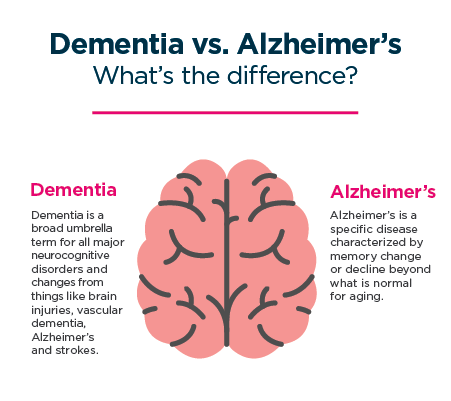Dementia and Alzheimer’s are words and conditions that you may be familiar with. However, though they are related, they are not interchangeable.

What is dementia?
“Dementia is a broad term for all major neurocognitive disorders,” said Dr. Benjamin Hunter, a Marshfield Clinic Health System neuropsychologist. “It can include mental changes from brain injuries, seizure disorders, strokes, Alzheimer’s and vascular dementia, among others.”
What is Alzheimer’s?
Alzheimer’s is a disease that includes memory change or decline beyond what is normal for aging. Memory problems are the first symptoms, followed by difficulties with language. People often have trouble naming familiar objects or words and expressing their thoughts or ideas. Eventually, the disease spreads out from the memory centers to affect all other parts of the brain.
“Age-related change is normal,” Hunter said. “But if memory declines beyond that, you should see your provider.”
Alzheimer’s causes and treatments
Some risk factors for developing Alzheimer’s do exist. While there is a genetic link that can affect your likelihood of cognitive decline, lifestyle has a big impact as well. Exercise habits, quality of sleep, diet, how well your health conditions are managed, and alcohol and tobacco intake can affect your chances of developing Alzheimer’s. Generally speaking, the healthier you are, the more protected you are against cognitive change.
As of right now, there is no cure for Alzheimer’s.
“There are some medications that can help slow down the progression,” Hunter said. “However, lifestyle and behavior changes are some of the best options. Eating well, regular cardio exercise and good sleep are all helpful. Additionally, managing stress and remaining cognitively and socially engaged is important.”
While there is no cure, Hunter stressed that doesn’t mean there is no hope for a good quality of life for an extended time.
“There is often a general idea that if someone has Alzheimer’s, what does it matter? You can’t do anything,” Hunter said. “However, the quality of life and length can be helped a lot if we have a diagnosis. Even if it is not curable, there are things that can help. Please talk to your doctor if you think you or a loved one is showing signs of Alzheimer’s or another type of dementia.”
For dementia and Alzheimer’s resources in Wisconsin, learn more here.
For questions about Alzheimer’s and dementia, talk to a Marshfield Clinic Health System provider.
Learn more about neurology Find a neurology provider






Leave a Reply